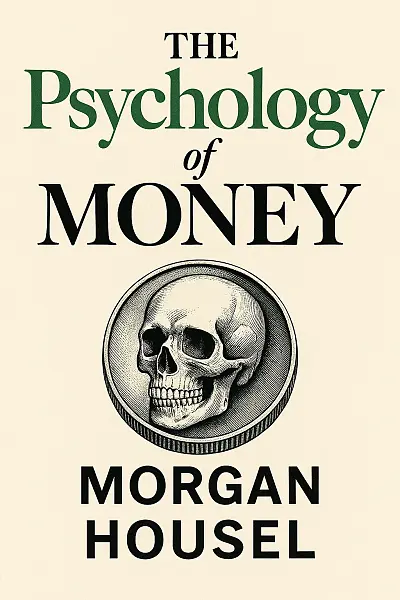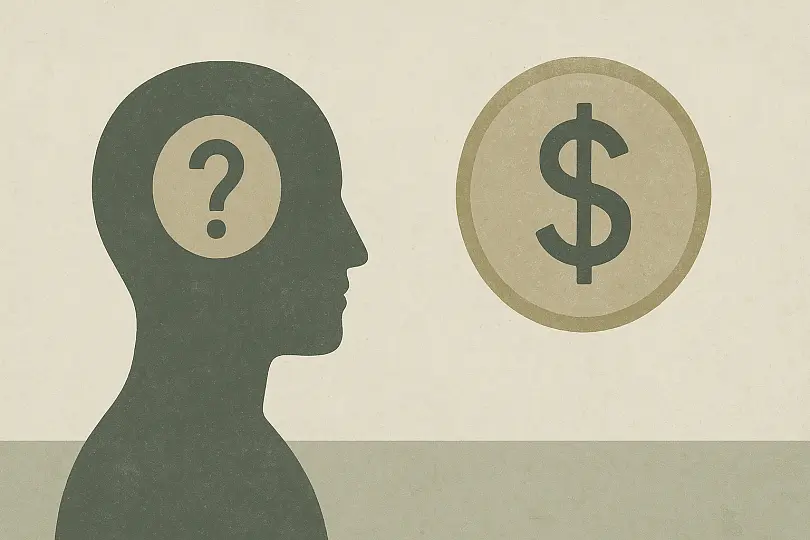
The Psychology of Money
by: Morgan Housel
Morgan, a curious observer of human behavior, moves through the everyday world where money shapes ambitions, anxieties, and dreams. Surrounded by people who think they understand finances, he senses something deeper: beneath the calculations and spreadsheets, it’s emotions driving decisions.
One day, Morgan realizes most people—even the smartest—struggle to act rationally about money, stirring a restless need to uncover why. Suddenly, the quest isn’t just about numbers, but about behavioral blind spots that threaten stability and happiness itself.
Through relatable stories and surprising insights, Morgan wrestles with whether we can ever truly master money’s hold, or if our own psychology will forever keep us guessing.
"Wealth grows not from what you earn, but from how patiently you respect what you already have."
Let's Break This Down
The Author's Voice
Atmosphere:
Inviting, reflective, and refreshingly down-to-earth
- The pages feel like sitting across from a wise, approachable friend—never preachy, just quietly insightful
- There’s a gentle, open mood, steering clear of dry academia and instead offering warmth and resonance
- The tone is candid and humble, with the author weaving personal anecdotes into real-world lessons, making once-intimidating money talk feel approachable and human
Prose Style:
Clear, crisp, and thoughtfully conversational
- Sentences are tight, utterly devoid of jargon, and flow like good coffee shop banter—easy to digest, never simplistic
- Housel prefers bold, declarative statements, punctuated by illuminating little stories and punchy conclusions
- You’ll find zero fluff or filler; every word has a purpose, stripping down complex ideas to their clearest essence
- Anecdotes and vivid metaphors pepper the writing, giving it a lively, illustrative feel without slowing momentum
Pacing:
Brisk, dynamic, and irresistibly moreish
- The book moves at a sprightly pace, with short, focused chapters that beg you to “just read one more”
- There’s a smart balance between theory and relatable narrative—never lingering too long on data or dwelling on a single idea
- Expect frequent shifts from concept to story to takeaway, which keeps the energy high and your attention glued
- The structure invites readers to dip in and out at will, making it perfect for both binge reading and bite-sized browsing
Overall Vibe:
Accessible wisdom meets real-world application
- Approachable, non-intimidating, and dotted with wit—ideal for readers who want insight without a lecture
- Housel’s style is motivational yet grounded, shunning grand promises in favor of deep, quietly powerful truths
- If you want a money book that feels like a friend guiding you rather than a professor lecturing you, this is it—readable, relatable, and sneakily profound
Key Moments
- “Doing well with money isn’t about what you know—it's about how you behave.”
- Gut-punch anecdotes: millionaires who lose it all vs. janitors who quietly build fortunes
- Slow wealth beats fast wins—chapter on compounding that’ll make you rethink everything
- “Enough”—the chapter that slaps you with the dangers of never knowing your true limit
- Sly, story-driven writing—every lesson arrives wrapped in a memorable, real-world example
- Emotional honesty about envy, luck, and the myth of rational investors
- That eye-opening moment when you realize the wildest risk with money is often yourself
Plot Summary
The Psychology of Money by Morgan Housel isn’t a story-driven narrative but rather a collection of insightful essays exploring how people think about and behave with money. Housel opens by emphasizing that financial decisions are so rarely made with spreadsheets, and instead, they’re motivated by personal history, unique experiences, and even quirks of personality. Throughout the book, Housel walks readers through various anecdotes—from lottery winners to Wall Street bankers—and highlights unexpected lessons, like why being reasonable often beats being rational in finance. The “climax” is arguably found in the chapter exploring the seductive danger of never knowing when “enough” is enough, culminating with the message that wealth is what you don’t see: the money not spent. Ultimately, the book resolves by encouraging readers to embrace humility, patience, and self-awareness in all financial matters, suggesting that psychological mastery, not market mastery, is the real key to money.
Character Analysis
Although the book’s style is nonfiction, Housel crafts character sketches through vivid stories and real-life examples, such as Ronald Read (a janitor who dies a millionaire) and Richard Fuscone (a highly educated executive who goes bankrupt). These “characters” represent diverse attitudes toward risk, luck, frugality, and ambition. Their different arcs—which often lead to either unexpected windfalls or devastating losses—illustrate Housel’s point that financial outcomes often hinge more on behavior than intelligence. The reader is almost another character, constantly challenged to reflect on and reconsider their own approach to money, learning and potentially changing alongside the anecdotes presented.
Major Themes
Housel’s biggest theme is that financial success is more about behavior than knowledge. He shows that luck and risk are major influences (for example, Bill Gates’s unique chances in life), and that humility and recognizing the limits of your understanding are crucial. Another core message is that contentment and knowing “when to stop” are underrated skills—chasing more money can have disastrous effects, as seen in his comparison between Read and Fuscone. The importance of time—both as a force for compounding wealth and as a way to heal mistakes—is woven through the essays, reminding readers of the power of patience and long-term thinking.
Literary Techniques & Style
Housel’s style is conversational, witty, and packed with relatable anecdotes rather than dry financial jargon. He uses storytelling as his main technique—real people and vivid, sometimes shocking examples ground abstract ideas in tangible ways. Throughout, metaphors like “freedom as the highest dividend money pays” and simple, yet powerful, analogies keep the writing engaging. His varied sentence structure, direct addresses to readers, and use of rhetorical questions create an inviting, thoughtful atmosphere that never feels condescending.
Historical/Cultural Context
Published in 2020, the book reflects on decades of financial history, with a special eye toward the aftermath of the 2008 financial crash and the COVID-19 pandemic era. Housel taps into widespread anxieties about wealth inequality, economic volatility, and financial security, positioning his advice for a contemporary audience often obsessed with instant success and speculation. The cultural backdrop emphasizes humility and self-restraint as counterpoints to our era’s love affair with growth-at-all-costs and social comparison.
Critical Significance & Impact
The Psychology of Money stands out in the financial nonfiction genre by focusing on what’s going on inside the mind, rather than just bank accounts. Critics and readers have embraced its blend of behavioral economics and practical wisdom, making it a bestseller and a staple recommendation for those new to personal finance. Its influence is lasting because it doesn’t age with specific money advice—its observations about human nature and decision-making are relevant across cultures and generations, sparking countless discussions about the true meaning of wealth and success.

How we think shapes our wealth—timeless lessons for mastering money’s mind games
What Readers Are Saying
Right for You If
If you’ve ever found yourself wondering why some people seem to make brilliant money decisions while others struggle (even when both know their stuff), The Psychology of Money is honestly a must-read. You’ll LOVE this book if:
- You’re into personal finance but hate dry, number-crunchy explanations—Morgan Housel skips financial jargon and gets real about why we act the way we do with money.
- Stories over spreadsheets are your thing. This book is full of relatable tales and life lessons—perfect if you prefer anecdotes to textbook charts.
- Big thinking about behavior, choices, and habits is what you’re after. If you like books that dig into mindset (think Atomic Habits, but about money), you’ll eat this up.
- You’re new to the world of finance and want something approachable, or you’ve read all the traditional personal finance books and want something fresh—this isn’t just another “invest in index funds” manual.
But fair warning—this isn’t the right pick for everyone. If you’re looking for:
- Step-by-step budgeting strategies or actionable investment plans, you might be left wanting more. Housel talks why, not how.
- Deep dives into technical economics or investment theory. This book is big on psychology and stories, light on formulas and hard-core advice.
- A fast-paced thriller or narrative nonfiction—this one's definitely more thoughtful and reflective than gripping or plot-driven.
Bottom line: If you love thinking about why people (and you!) behave the way they do with money—and you’re cool with a book that’s more wisdom than worksheet—you’ll probably race through these pages. But if you want detailed, hands-on money management tips, it might be better to grab something a bit more tactical.
What You're Getting Into
Ever wondered why people make baffling financial decisions?
The Psychology of Money by Morgan Housel invites you into a fascinating journey through the emotional and psychological forces that shape how we think about wealth. With relatable stories and sharp insights, Housel explores the central conflict between what we know about money and how we behave with it—offering a friendly, thought-provoking guide for anyone curious about mastering their financial mindset.
Characters You'll Meet
-
Morgan Housel: Narrator and guide of the book, Housel weaves together personal anecdotes and historical stories to unpack the emotional side of money. His humble, reflective tone helps demystify complex financial concepts for everyday readers.
-
Ronald Read: A janitor and gas station attendant whose simple, disciplined investing exemplifies the power of patience over income. Read’s story challenges common assumptions about wealth and financial success.
-
Richard Fuscone: A former Merrill Lynch executive whose lavish lifestyle contrasts with Ronald Read’s modesty. Fuscone's downfall serves as a cautionary tale about hubris and the dangers of overleveraging, highlighting the psychological traps of wealth.
-
Grace Groner: A secretary who quietly amassed a fortune through prudent saving and investing. Groner represents the overlooked potential of steady, long-term financial behavior, emphasizing “time in the market” over flashy moves.
-
Jesse Livermore: A legendary stock trader whose meteoric gains and tragic end underline the peril of chasing quick riches. Livermore’s arc illustrates the dangers of greed and the unpredictability of markets.
More Like This
Morgan Housel’s The Psychology of Money will instantly remind readers of the grounded wisdom in The Millionaire Next Door. Both books demystify wealth by focusing more on mindset and behavior than flashy investment tactics, giving you that satisfying “aha” effect about what truly builds lasting financial success. At the same time, it’s got a storytelling charm that fans of Atomic Habits will appreciate—Housel unpacks complex ideas with the same breezy, approachable tone that James Clear uses for habits, making financial concepts feel like they belong in everyday conversations over coffee.
For anyone who’s ever watched Succession and been fascinated (and slightly horrified) by how decisions about money ripple through personal relationships, The Psychology of Money offers a thoughtful, real-world counterpart. Housel explores how emotions, upbringing, and ego color our financial choices, echoing the sharp, psychological maneuvering and family drama of the Roys—minus the boardroom backstabbing. It’s like getting an inside look at what all that wealth can do to people, but with more empathy and fewer corporate takedowns.
Critic's Corner
Ever wondered why two people with similar incomes end up living such radically different financial lives? That’s the provocatively simple—and oddly haunting—question Morgan Housel plants at the heart of The Psychology of Money. He suggests that money isn’t merely a math problem. It’s a stubbornly irrational, deeply emotional space where history, ego, fear, envy, and personal quirks often overrule logic. Housel invites readers to consider: What if being smart isn’t enough when it comes to your financial life?
Housel’s writing is friendly, brisk, and unpretentiously wise. He structures the book into 19 compact stories, each presenting a distinct behavioral insight or costly delusion about money. The prose is deceptively simple—there’s no whiff of financial jargon, no intimidating charts—just a steady stream of anecdotes, accessible metaphors (“wealth is what you don’t see”), and memorable one-liners that stick with you for days. Despite the book’s weighty subject, it never feels dry. Housel has a knack for illustrating complex psychological truths through real-life stories and historical references. The result is a narrative that’s both educational and genuinely enjoyable, traversing characters from Warren Buffett to ordinary people next door. His talent for distilling messy realities into crisp, memorable takeaways will resonate with readers who like clarity over complexity.
At its core, The Psychology of Money tackles how emotions, upbringing, luck, and culture shape financial choices far more profoundly than spreadsheet logic ever could. Housel explores the power of compounding, the dangers of “outcome-based thinking,” and the subtle ways our environment wires us for greed or paranoia. Importantly, he refuses the one-size-fits-all advice endemic to finance books. Instead, he argues for humility, patience, and the understanding that your relationship with money is inseparable from your life history. This is especially timely—in an age of economic upheaval and “get-rich-quick” schemes gone viral, Housel’s call for self-awareness and realistic expectations feels urgent. He urges us to define our own sufficiency and happiness, sidestepping cultural and generational pressures.
Within the crowded landscape of personal finance books, Housel is not dishing out bulletproof investment tips. Instead, he stands alongside writers like Daniel Kahneman (Thinking, Fast and Slow) and Daniel Ariely (Predictably Irrational), focusing on the hidden drivers of human behavior rather than the mechanics of markets. Yet, his style is breezier, more anecdotal, and less academic—a bridge between dense behavioral economics and practical self-help.
If the book has a weakness, it’s this: some stories risk feeling repetitive, each circling the same core idea from slightly different angles. Readers craving step-by-step solutions may not find them here. But that’s almost beside the point: The Psychology of Money matters precisely because it reorients the conversation toward humility, self-knowledge, and the art of not losing your head. For anyone living at the messy intersection of logic and longing—and who isn’t?—this is essential reading.
Community Thoughts
I didn’t expect a money book to haunt me, but the story about Ronald Read, the janitor who amassed millions, sticks in my brain. It’s wild how the simplest habits can shatter every flashy finance myth I ever believed.
I thought I’d breeze through The Psychology of Money, but that one line—“doing well with money has little to do with how smart you are and a lot to do with how you behave”—stuck in my head all night. Can’t unsee it.
i stayed up way too late rereading the part about luck versus risk and now i can't look at my bank account the same. why did this book have to mess with my sense of control like that?
that chapter about luck vs. risk made me rethink every financial decision I've ever made. seriously, it spun my brain for hours and I couldn't sleep, just kept replaying all the times I thought I was "smart" with money.
That bit about “doing well with money has little to do with how smart you are and a lot to do with how you behave” wouldn’t leave my head. Had me rethinking every financial choice I’ve ever made.
Leave Your Review
Local Take
Why It Matters
How The Psychology of Money Connects with Chinese Readers
So, Morgan Housel’s take on money and behavior lands pretty uniquely in China!
-
Parallel Moments:
The book’s spotlight on long-term thinking and delayed gratification echoes vibes from China’s post-70s economic boom—think ambitious parents who sacrificed personal comfort for future family stability. Reminders of the 1990s’ wild stock and housing markets hit home, especially for boomers who rode those waves. -
Cultural Alignments/Clashes:
The theme of “wealth ≠ happiness” meshes with Confucian values around contentment and family harmony, but it does clash against today’s “996 grind culture” and insane social pressure to own property and climb fast. -
Why Certain Stories Land Differently:
Housel’s anecdotes about risk feel especially relevant in a country where luck, guanxi (connections), and unpredictable policy changes can make or break fortunes overnight. -
Literary Echoes:
It’s refreshing because The Psychology of Money rejects get-rich-quick tales—something you see a lot in local “financial success” memoirs. Housel’s narrative style, super accessible and anecdotal, stands out amid the often didactic tone of Chinese self-help books.
Honestly, it’s like getting financial wisdom from a worldly, wise neighbor—someone who just “gets” the local money mindset struggles!
Food for Thought
Notable Achievement & Cultural Impact
The Psychology of Money by Morgan Housel has sold over 4 million copies worldwide, making it one of the most influential personal finance books of the last decade. It's frequently recommended by financial advisors and has sparked broad discussions about the role of human behavior in financial success, reshaping the way millions think about money and investing.
Like what you see? Share it with other readers







